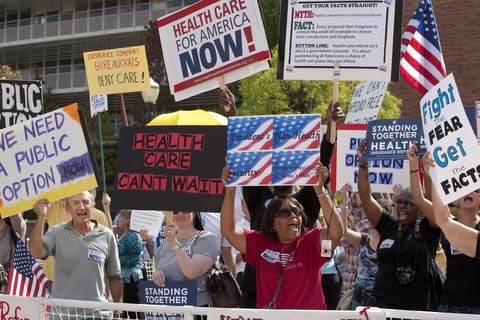Health Care Debate Based on Lack of Logic

Heated partisan debate over President Obama's health care plan, erupting at town hall meetings and in the blogosphere, has more to do with our illogical thought processes than reality, sociologists are finding.
The problem: People on both sides of the political aisle often work backward from a firm conclusion to find supporting facts, rather than letting evidence inform their views.
The result: A survey out this week finds voters split strongly along party lines regarding their beliefs about key parts of the plan. Example: About 91 percent of Republicans think the proposal would increase wait times for surgeries and other health services, while only 37 percent of Democrats think so.
Irrational thinking
A totally rational person would lay out — and evaluate objectively — the pros and cons of a health care overhaul before choosing to support or oppose a plan. But we humans are not so rational, according to Steve Hoffman, a visiting professor of sociology at the University of Buffalo.
"People get deeply attached to their beliefs," Hoffman said. "We form emotional attachments that get wrapped up in our personal identity and sense of morality, irrespective of the facts of the matter."
And to keep our sense of personal and social identity, Hoffman said, we tend to use a backward type of reasoning in order to justify such beliefs.
Get the world’s most fascinating discoveries delivered straight to your inbox.
Similarly, past research by Dolores Albarracin, a psychology professor at the University of Illinois at Urbana-Champaign, has shown in particular that people who are less confident in their beliefs are more reluctant than others to seek out opposing perspectives. So these people avoid counter evidence all together. The same could apply to the health care debate, Albarracin said.
"Even if you have free press, freedom of speech, it doesn't make people listen to all points of view," she said.
Just about everybody is vulnerable to the phenomenon of holding onto our beliefs even in the face of iron-clad evidence to the contrary, Hoffman said. Why? Because it's hard to do otherwise. "It's an amazing challenge to constantly break out the Nietzschean hammer and destroy your world view and belief system and evaluate others," Hoffman said.
Just the facts you need
Hoffman's idea is based on a study he and colleagues did of nearly 50 participants, who were all Republican and reported believing in the link between the Sept. 11, 2001 terrorist attacks and Saddam Hussein. Participants were given the mounting evidence that no link existed and then asked to justify their belief.
(The findings should apply to any political bent. "We're not making the claim that Democratic or liberal partisans don't do the same thing. They do," Hoffman said.)
All but one held onto the belief, using a variety of so-called motivated reasoning strategies. "Motivated reasoning is essentially starting with a conclusion you hope to reach and then selectively evaluating evidence in order to reach that conclusion," explained Hoffman's colleague, sociologist Andrew Perrin of the University of North Carolina, Chapel Hill.
For instance, some participants used a backward chain of reasoning in which the individual supported the decision to go to war and so assumed any evidence necessary to support that decision, including the link between 9/11 and Hussein.
"For these voters, the sheer fact that we were engaged in war led to a post-hoc search for a justification for that war," Hoffman said. "People were basically making up justifications for the fact that we were at war."
Their research is published in the most recent issue of the journal Sociological Inquiry.
Hot health care debate
The proposed health care plan has all the right ingredients for such wonky reasoning, the researchers say.
The issue is both complex (no single correct answer), emotionally charged and potentially history-changing , while debates often occur with like-minded peers in town hall settings. The result is staunch supporters and just-as-staunch critics who are sticking to their guns.
"The health care debate would be vulnerable to motivated reasoning, because it is, and has become, so highly emotionally and symbolically charged," Perrin said during a telephone interview, adding that images equating the plan with Nazi Germany illustrate the symbolic nature of the arguments.
In addition, the town hall settings make for even more rigid beliefs. That's because changing one's mind about a complex issue can rattle a person's sense of identity and sense of belonging within a community. If everyone around you is a neighbor or friend, you'd be less likely to change your opinion, the researchers say.
"In these one-shot town hall meetings, where you have an emotionally laden complex issue like health care, it's very likely you're going to get these ramped up emotionally laden debates. They're going to be hot debates," Hoffman told LiveScience.
Two-sided discussion
To bring the facts from both sides to the table, Hoffman suggests venues where a heterogeneous group of people can meet, those for and against the proposed health care system overhaul. And at least some of these gatherings should include just a handful of people. In groups of more than about six people, one or two members will tend to dominate the discussion, he said.
For either side, logical arguments might not be the key.
"I think strategically it's important that the Obama administration and advocates of a health care plan really pay attention to how people feel and the symbolism they are seeing, and not just the nuts and bolts of the policy," Perrin said. "People don't reason with pure facts and logic alone."
Jeanna Bryner is managing editor of Scientific American. Previously she was editor in chief of Live Science and, prior to that, an editor at Scholastic's Science World magazine. Bryner has an English degree from Salisbury University, a master's degree in biogeochemistry and environmental sciences from the University of Maryland and a graduate science journalism degree from New York University. She has worked as a biologist in Florida, where she monitored wetlands and did field surveys for endangered species, including the gorgeous Florida Scrub Jay. She also received an ocean sciences journalism fellowship from the Woods Hole Oceanographic Institution. She is a firm believer that science is for everyone and that just about everything can be viewed through the lens of science.


